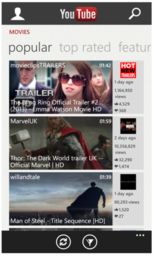| Microsoft Meets Google Halfway Over WP8 App |
| Written by Lucy Black | |||
| Thursday, 23 May 2013 | |||
|
Microsoft has updated its controversial You Tube App for Windows Phone. It has removed the video download functionality, but hasn't added the facility to display ads. This isn't likely to be anywhere near enough for Google and how it resolves the issue is important for all of us. As we reported last week, see Google Takes On Ad-Blocker Microsoft for the full story, when Google declined to produce a You Tube app for Windows Phone 8, or provide access to the full API to make the task easy, Microsoft produced its own You Tube app by some nifty reverse engineering.
The resulting app, released on May 7th had two signifcant differences from the standard Google - originated smartphone You Tube App - it permitted downloads of videos and it didn't include any advertising. It took just over a week for Google to respond with a cease-and-desist notice on May 15th which gave Microsoft until May 22nd to pull the app. As Google's main complaint appeared to be that the lack of advertising negatively affect developers who depended on such revenue Microsoft initially responded by saying it would be "more than happy" to include advertisements if Google gave access to the APIs. Something that Google hasn't done. Rather than pull the app, Microsoft produced an updated version on May 22nd and a statement: “Microsoft updated the Windows Phone YouTube app to address the restricted video and offline video access concerns voiced by Google last week. We have been in contact with Google and continue to believe that our two companies can work together to hone an app that benefits our mutual customers, partners and content providers." What Microsoft hasn't done is to enable advertising in the You Tube app, something that is certainly not beyond its capability. This is presumably to put pressure on Google to provide it with the full official API. The argument seems to be taking out a feature that breaks the terms of use is perfectly reasonable but having to put in a feature based on an undocumented API to meet the terms of use is completely unreasonable. This is a fine and logical argument but the unspoken response it that Google doesn't want to supply the API and the only resolution it would find acceptable is to withdraw the app - this solves all the issues of meeting the terms of use in one go. How this turns out will influence the future for all developers wanting to use APIs that give their competitors the edge. Related ArticlesGoogle Takes On Ad-Blocker Microsoft Rationality, advertising and profit To be informed about new articles on I Programmer, install the I Programmer Toolbar, subscribe to the RSS feed, follow us on, Twitter, Facebook, Google+ or Linkedin, or sign up for our weekly newsletter.
Comments
or email your comment to: comments@i-programmer.info
|
|||
| Last Updated ( Friday, 24 May 2013 ) |



